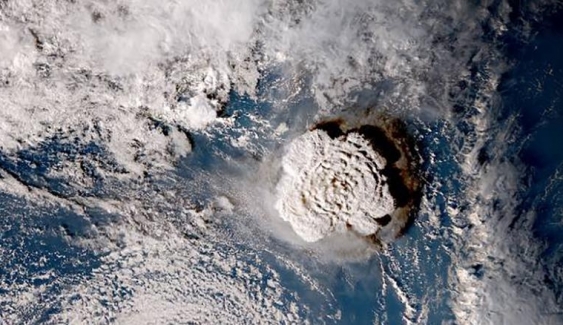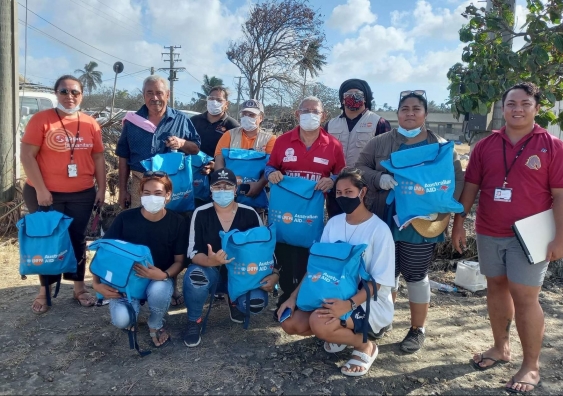“Our world is black and grey,” Katherine Mafi, the programme manager of the Tonga Family Health Association (TFHA), told us over a crackly satellite phone connection from the tiny Pacific Island nation on January 19. It was the first direct contact we were able to make with Mafi and her team after the devastating volcanic eruption and tsunami that tore through Tonga on January 15, leaving behind a thick blanket of ash and a humanitarian disaster.
TFHA is a member association of the International Planned Parenthood Federation (IPPF) – a leading global advocate of sexual and reproductive health and rights. As the deputy director of IPPF’s humanitarian programme, I work closely with our member associations across the region to mobilise staff, funding, and sexual and reproductive health (SRH) commodities in an emergency, such as a conflict or disaster.
The Tongan government estimates that more than 84,000 people (about 84 per cent of the population) have been directly affected by the disaster.
This time, a near total communications blackout, Tonga’s shuttered borders, and the added risk of spreading COVID-19 through the deployment of foreign aid workers to supplement the in-country team, meant that our emergency response in Tonga needed to be different.
Locally led aid delivery can navigate some of these challenges. And as often one of the sole providers of sexual and reproductive health care for women and girls in humanitarian settings, IPPF – through TFHA – can ensure that this fundamental right is not overlooked.
Sexual and reproductive health is compounded in a crisis
It is well documented that women and girls are disproportionately affected during a humanitarian crisis. According to UN Women, a staggering 70% of women and girls are likely to experience sexual and gender-based violence (SGBV) in these settings. They are also at heightened risk of trafficking, forced marriage and early or child marriage. Among the reasons are: the disruption of the family unit or home; the collapse of health systems; high levels of stress and feelings of powerlessness related to the loss of housing, land, and livelihoods; the scarcity of basic resources; and post-traumatic stress.
The Tongan government estimates that more than 84,000 people (about 84 per cent of the population) have been directly affected by the disaster. Catastrophic damage occurred on Mango and Fonoifua Islands, located northeast of the main island of Tongatapu, where almost all the houses were destroyed, displacing more than 1500 people. Extensive damage has also been observed on Ha’afeva, Nomuka and Tungua Islands, and volcanic ash has contaminated water supplies throughout Tonga. Several health centres have been damaged, and one health centre on Nomuka was destroyed by the tsunami.

An image released by the Japanese Meteorological Organisation showed the vast size of the Tonga volcano eruption in January. Photo: Japanese Meteorological Organisation
Amid this terrifying devastation, Tongans need safety and protection above all. Access to high quality and compassionate SRH services including maternal health care, contraception, post abortion care, and SGBV counselling can save the lives of women and girls and prevent further suffering. TFHA is deeply rooted in the local community, having responded to similar crises following Cyclone Gita in 2018 and Cyclone Harold in 2020, and the organisation benefits from greater acceptance and access in delivering these lifesaving services.
Localisation: From theory to practice
The term ‘localisation’ is a buzz word in the humanitarian sector. By definition, it is the process by which local and national actors are more involved in the planning, delivery and accountability of humanitarian action, while still responding to needs quickly and efficiently.
Beyond subscribing to this concept in theory, we as global humanitarian observers are witnessing localisation in Tonga in practice.
Immediate humanitarian response is crucial to assess needs, provide emergency care and mobilise resources – including overlooked SRH commodities such as contraceptives, medicines and hygiene products. As a local service provider, TFHA navigates two major barriers facing an internationally coordinated response.
The first barrier is communication. The eruption caused extensive damage to the underwater cable that provides Tonga with internet connectivity, silencing our typical communication channels. Thankfully, I was able to make initial contact with the TFHA through a satellite phone at the Australian High Commission in Tonga, but until the internet and phone lines are up and running again, communication remains patchy and unreliable.
Read more: What can we learn from the world' biggest waves
Another challenge, however, is that Tonga has stayed virtually COVID-free since the start of the pandemic through strict border control and quarantine measures. Despite the urgent need for aid, the Tongan government is understandably hesitant to allow foreign aid workers into the country, as they could spread the virus and burden the already damaged health care system. On February 1, these risks became reality when two port workers contracted COVID-19, prompting a national lockdown that has been extended until at least February 27. Two of TFHA’s staff members have also tested positive.
Humanitarian supplies continue to arrive in Nuku’alofa through contact-less drop-off and release, but all shipments must undergo disinfection and a 72-hour quarantine before being moved. Thus, on top of delaying the implementation of humanitarian responses, the lockdown further complicates efforts to reach those in need.
There are an estimated 1470 women in Tonga who are currently pregnant, with over 200 due to give birth within the month. TFHA is distributing Clean Delivery Kits, with support from UNFPA, the United Nations’ sexual and reproductive health agency. The kits help facilitate clean and safe childbirth when women are unable to attend a medical facility. Hundreds of customised ‘Dignity Kits’ and ‘Menstrual Hygiene Management Kits’ are also being distributed among women and girls, including those with disabilities. These kits include items such as underwear, disposable pads, soaps, wash cloths, diapers, health information pamphlets and a sulu, which is piece of fabric worn as a sarong by many Pacific Islander women.
Read more: We can no longer ignore the threats facing the Pacific — we need to support more migration to Australia
Over 500 women die in pregnancy or childbirth every day in humanitarian and fragile settings, according to UNFPA. The timely provision of SRH services can prevent death, disease and disability. These activities include: pregnancy and delivery support, basic emergency obstetric and newborn care, post-abortion care, contraceptives, clinical care for rape survivors, sexual and gender-based violence support, and treatment for sexually transmitted infections including HIV. Once the lockdown is lifted, TFHA will be providing these lifesaving activities through mobile clinics and service delivery points on the islands of Tongatapu, ‘Eua, Ha’apai and ‘Atata.
Leaving no one behind
Tonga is still in the middle of cyclone season, and as the worsening effects of climate change continue to cause more frequent and severe natural disasters that profoundly impact women and girls, it is essential that their needs and voices are not left behind.
IPPF’s activities in the Pacific region are largely funded by the Australian government, which quickly approved our response budget and has contributed to its implementation in this complicated context. But sexual and reproductive health and rights remain chronically underfunded. Significant cuts to the UK aid budget, which is the world’s second-largest donor to such programs next to the United States, will disproportionately impact vital SRH care for women and girls worldwide.
Some ways in which the global humanitarian sector can empower local actors to lead emergency responses include providing safe and post-abortion care in humanitarian settings; prioritising SGBV response and prevention; coordinating with local governments to ensure SRH is included in disaster management plans, and integrating into the UN cluster system – before an emergency arises.
It shouldn’t take a disaster for women and girls to access their sexual and reproductive health and rights.
With sustainable global funding and support, local actors can meet local needs for whoever requires it, for as long as they want it.
Dr Robyn Drysdale is Humanitarian Deputy Director, International Planned Parenthood Federation. She is a UNSW alumna, having completed her PhD in Public Health and Community Medicine in 2014.



